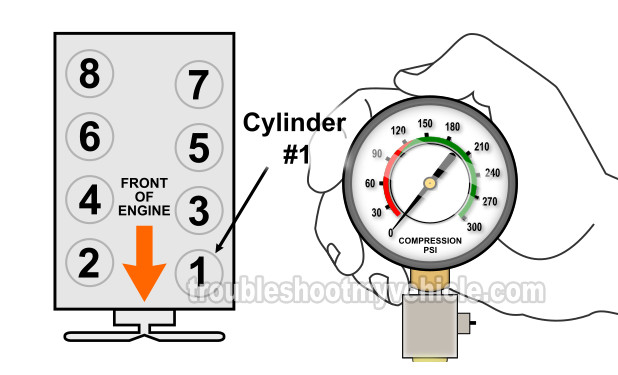
Testing the compression of the engine, on your 4.7L Dodge or Jeep SUV or pickup is not hard to do and in this tutorial, I'll show you how to do it and more importantly, how to interpret the results of your compression test.
Contents of this tutorial:
![]() You can find this tutorial in Spanish here: Cómo Probar La Compresión Del Motor (4.7L Dodge) (at: autotecnico-online.com).
You can find this tutorial in Spanish here: Cómo Probar La Compresión Del Motor (4.7L Dodge) (at: autotecnico-online.com).
Symptoms Of Low Engine Compression
There are 3 things, the 4.7L engine in your Dodge or Jeep vehicle needs to start, idle smooth and accelerate: Fuel, Spark and Air.
The ‘Air’ part is handled by several components, among them are the piston rings and cylinder head valves.
When these wear out (piston rings and/or cylinder head valves), the affected cylinder will have low or no compression and this will adversely affect the amount of air the cylinder can breathe in and then compress.
Low compression in one or several engine cylinders will have a direct impact on the way the engine idles and the way the engine accelerates. No compression on all cylinders and the engine won't start, it'll crank but not start.
Here are other symptoms of low or no compression that you'll see:
- Rough Idle.
- Check engine light (CEL) on with one or several of the following diagnostic trouble codes (DTCs):
- P0300, P0301, P0302, P0303, P0304, P0305, P0306, P0307, P0308.
- The spark plug (of the cylinder with low or no compression) will always get fuel fouled.
no compression in all of the cylinders will result in a cranks but does not start condition. The symptoms you'll see will be:
- No Start.
- Everything else works, for example:
- The fuel pump will activate, so you'll see fuel pressure at specification (if testing with a fuel pressure gauge).
- All of the COP coils will spark.
- If the COP coils are sparking, then this indirectly proves that the crank sensor is OK too.
- The PCM will still activate all of the fuel injectors.
- The spark plugs (of the cylinders with no compression) will always get fuel fouled.
What Tools Do I Need To Test The Engine Compression?
The most important tool that you're gonna' need is a compression tester. If you don't have one, you can rent one from your local Auto Zone or O'Reilly Auto Parts Store.
If you're gonna' buy one and want/need to save some bucks, buy it online and below is where I recommend you buy it.
Since the COP ignition coils and the spark plugs need to be removed, you'll need some of the following basic tools:
- Ratchet wrench.
- 5/8" spark plug Socket.
- Extensions for the ratchet wrench.
- Motor oil (for the ‘Wet’ compression test part).
In case you're needing to buy a compression tester and want to save money by buying it online, you can shop here:
What Is Engine Compression?
In a nutshell, engine compression refers to the fact that the air that the engine breathes in is compressed (after it's been mixed with fuel).
Once the air and fuel mixture is compressed, it's then ignited by a spark from the spark plug (the actual process is a bit more complicated but for our purposes, and since we're not trying to reverse engineer the engine, this brief overview is more than enough).
As I mentioned before, each engine cylinder needs 3 things to run optimally:
- Air.
- Fuel.
- Spark.
The ‘Air’ part includes healthy compression in all of the 8 cylinders, among several things.
If any one of these three is missing from the mix, the engine cylinder that's being affected will not produce power (or not enough). This will cause the engine to have a miss (also known as a misfire condition) and you're gonna' feel it when the engine idles and/or when you accelerate the engine.
Alright, let's turn the page and get testing.



